
Michael Joe Cini
7th June 2022
Enhancing Medical technology: the impact of Artificial Intelligence
Opportunities for Artificial intelligence in medical applications
Artificial intelligence (AI) has touched nearly every aspect of modern life, the healthcare system included. An increasing number of medical devices incorporate AI capabilities to support therapeutic and diagnostic applications. Countless ways in which AI can transform medical technology have been identified, and this explains why the global software revenue from its top cases in healthcare is expected to grow from $3.7 billion in 2019 to around $67 billion by 2027. Start-ups are jumping at the opportunity to create innovations; global venture funding in AI-focused start-ups grew by an estimated 50% between 2017 and 2018.
Artificial intelligence: Tomorrow’s medical pillar?
Attempts have been made to define artificial intelligence: Techopedia defined AI as a branch of computer science that aims to imbue software with the ability to analyze its environment and then make decisions based on those analyses. Artificial intelligence describes the capability of algorithms to take over tasks and decisions by mimicking human intelligence.
Making deductions from these, medical artificial intelligence can therefore be referred to as a medical technology that can collect health data, analyze it, and make informed decisions based on the data.
AI improves the healthcare experience for patients and providers by providing more efficient ways to increase care capacity while meeting the high demand for virtual care. Some of the top use cases for AI in healthcare include medical treatment recommendations, assistance in medical diagnosis, and medical imaging analysis. Artificial intelligence also reduces the load on the administrative front by converting paperwork to digital data, automating report generation, and managing patient records.
AI in Medical Device
Although AI in the Medtech sector is still relatively in its early stages, expectations for this technology are high. Artificial intelligence, hopefully, will be able to support health professionals in critical tasks, automating and controlling complex processes. This will enable diagnosis, therapy and care to be optimally aligned to patients’ needs, thereby improving treatment efficiency, consequently ensuring an effective and affordable healthcare sector.
In clinical applications, AI is predominantly used for diagnostic purposes. Analysis of medical images is the area where the development of artificial intelligence models is most advanced. AI is successfully used in radiology, ophthalmology, dermatology, oncology, and other medical disciplines. Some of the advantages of using artificial intelligence in medical applications include the speed of data analysis and the capability of identifying patterns invisible to the human eye.
Patients Monitoring
Asides from making diagnoses, artificial intelligence can be incorporated into remote patient monitoring systems (RPMS) to provide a richer experience for patients that are unable to physically visit the actual facilities.
Enhancing Patients Data
When combined with machine learning technology, AI amplifies important data and enhances data on individual patients for superior treatment, as in precision medicine, genomics, and drug discovery.
As regards genomics, patient data can be attached to individual electronic medical records, for optimized clinical decision-making throughout the patients’ lives.
Self-monitoring Devices
Wearable technology has come a long way. Initially, they were simply counting steps, tracking heart rates and exercise habits. With more functions, there has been a wider acceptance, adoption, and use of these self-monitoring devices.
The market, featuring devices such as sweat meters that help diabetics monitor blood sugar levels and oximeters that monitor the oxygen concentration in the blood for respiratory disease patients, is expected to climb to around $27 million in 2023, up from $8 million in 2017. The United States healthcare system alone could save up to $7 billion per year with data stemming from health apps and wearables for preventative care.
Conclusion
Artificial intelligence is already being used in the Medtech sector; the number of AI algorithms certified as medical devices has increased significantly over the last few years. There are however reservations, speculations, and concerns.
Regulations and requirements have been put in place for approving artificial intelligence in medical devices. Indeed, as technical innovations are being developed, safety (in medical devices) should be the major player.
About Med-Tech World:
It is now estimated that the global digital health market will increase to around $640 billion by 2026. Through our expertise coupled with optimized networking, we will ensure that both investors and startups are on the ground floor of this health revolution. The event which is organized and curated alongside a team of doctors, attracts legislators and policymakers, medical professionals, and investors from across the world, addresses the opportunities and challenges driving this million-dollar forum.




